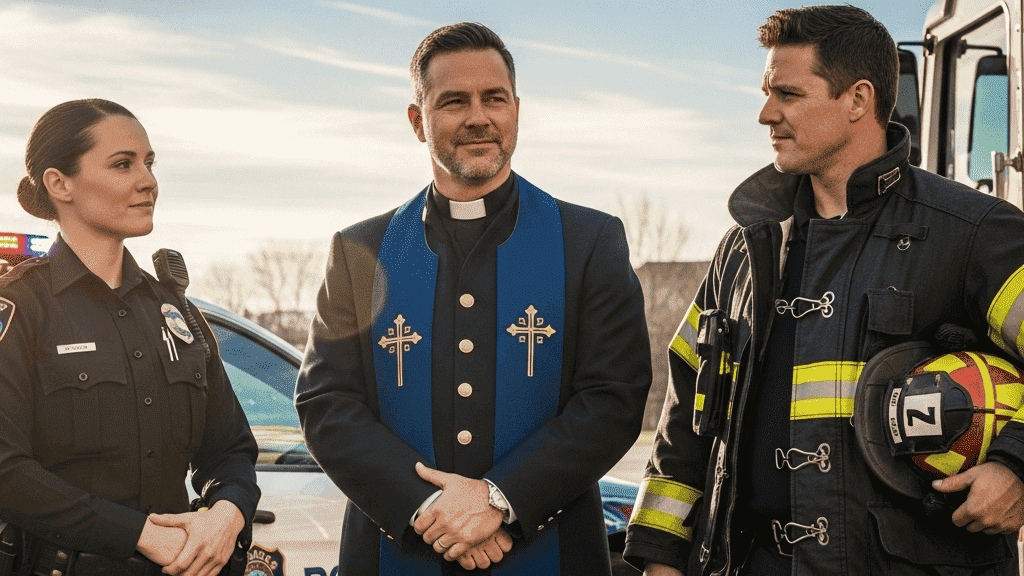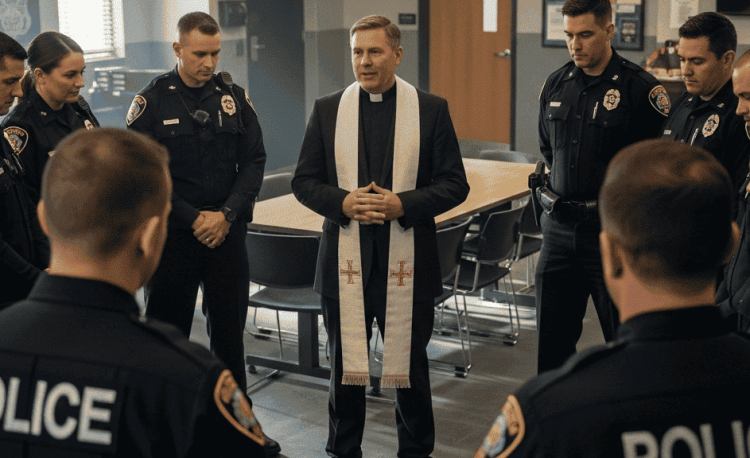Bachelor of Law Enforcement and First Responder Chaplaincy
Providing Compassionate Spiritual Support to Heroes on the Front Lines
Enroll Now“Your word is a lamp for my feet, a light on my path.” — Psalm 119:105 (NIV)
Program Overview: Law Enforcement and First Responder Chaplaincy
Law enforcement and first responder chaplaincy is a specialized field that focuses on providing spiritual and emotional support to individuals working in law enforcement agencies and emergency response organizations. These chaplains play a crucial role in offering guidance, comfort, and counseling to personnel who often face highly stressful and demanding situations.
The philosophy of law enforcement and first responder chaplaincy recognizes the significance of the well-being of law enforcement officers and first responders in the effective functioning of these organizations. Chaplains understand that the nature of their work exposes them to trauma, loss, and emotional challenges, which can impact their mental and spiritual health. By providing support, chaplains contribute to the overall resilience, morale, and well-being of the personnel they serve.
Chaplains in law enforcement and first responder contexts need to be aware of relevant laws, regulations, and protocols governing these agencies. They must demonstrate professionalism, cultural sensitivity, and an understanding of the unique needs and challenges faced by personnel in these high-stress professions.
Ultimately, law enforcement and first responder chaplaincy serves as a valuable resource for the emotional and spiritual well-being of individuals working in these demanding fields. By providing support, guidance, and counseling, chaplains contribute to the overall resilience and effectiveness of law enforcement agencies and emergency response organizations.

Key Highlights of the Law Enforcement and First Responder Chaplaincy Program
Crisis Intervention Training
Specialized skills for supporting personnel during critical incidents.
Ethical & Cultural Competence
Understanding legal protocols and diverse cultural needs in chaplaincy.
Spiritual & Emotional Care
Providing vital support for mental and spiritual well-being of first responders.
At a Glance: Bachelor of Law Enforcement and First Responder Chaplaincy
TOTAL REQUIRED CREDIT HRS
120
PROGRAM DURATION
3-6 years
DELIVERY MODE
Online | Hybrid | Face-to-Face
ENROLMENT
Continuous | Cohort (by location)
TUITION FEES
US $4,310
AWARD EARNED
Bachelor’s Degree
Program Outcomes for Law Enforcement and First Responder Chaplaincy
Upon successfully completing the Bachelor of Law Enforcement and First Responder Chaplaincy, graduates will be equipped to:
- Provide Critical Support: Offer compassionate spiritual and emotional care to law enforcement and first responder personnel during routine duty and critical incidents.
- Understand High-Stress Environments: Comprehend the unique psychological and spiritual challenges faced by individuals in high-stress, emergency response professions.
- Apply Ethical & Legal Frameworks: Operate within relevant legal, ethical, and organizational protocols governing chaplaincy within public safety agencies.
- Facilitate Resilience: Contribute to the mental, emotional, and spiritual resilience and well-being of personnel, fostering a supportive environment.
- Engage in Community Building: Bridge relationships between public safety agencies and the communities they serve, promoting understanding and trust.
- Develop Practical Skills: Master skills in crisis intervention, trauma-informed care, confidential counseling, and grief support specific to first responder needs.
Understanding Law Enforcement and First Responder Chaplaincy Programs
Chaplaincy programs within law enforcement and first responder agencies typically have specific parameters and protocols to ensure effectiveness and maintain appropriate boundaries. Here are some key elements commonly found in these programs:
-
Specialized Training:
Chaplains undergo specialized training to develop the skills and knowledge required to serve in the law enforcement and first responder context. This training may cover topics such as crisis intervention, trauma response, cultural sensitivity, ethics, and confidentiality.
-
Confidentiality and Boundaries:
Chaplains understand the importance of confidentiality and adhere to strict ethical guidelines. They provide a safe and non-judgmental space for personnel to discuss personal and professional concerns, respecting the boundaries of privacy and confidentiality.
-
Spiritual Support:
Chaplains offer spiritual guidance and support based on the religious and spiritual beliefs of the individuals they serve. They provide a listening ear, prayer, religious rituals, and pastoral counseling, as appropriate and requested.
-
Emotional and Psychological Support:
Chaplains provide emotional and psychological support through active listening, counseling, and referrals to professional resources when needed. They assist personnel in processing traumatic events, grief, stress, and other challenges associated with their roles.
-
Critical Incident Response:
Chaplains play a vital role in critical incident response by providing immediate support to personnel and their families in the aftermath of traumatic events. They may be present at the scene, offering comfort, spiritual guidance, and assistance in notifying next of kin.
-
Community Outreach:
Chaplains engage in community outreach initiatives to build bridges between law enforcement agencies, first responder organizations, and the communities they serve. They may participate in public events, deliver educational presentations, and collaborate with local religious and community leaders.
-
Ride-along and On-Call Availability:
Chaplains often accompany law enforcement officers and first responders on their duties to gain a better understanding of the challenges they face. They are also available on-call to respond to critical incidents and provide support whenever needed.
Future Academic Paths for Law Enforcement and First Responder Chaplains
A Bachelor of Law Enforcement and First Responder Chaplaincy offers a robust foundation for continued professional development and advanced academic pursuits. Graduates may seek further education to specialize, enhance their expertise, or enter academic roles. Potential future academic paths include:
- Master of Arts (M.A.) in Christian Counseling or Crisis Response: Specializing in advanced psychological and spiritual support techniques for trauma and crisis.
- Master of Divinity (M.Div.): A comprehensive theological degree for those seeking ordination or broader pastoral roles while applying chaplaincy principles.
- Doctor of Ministry (D.Min.) with a focus on Chaplaincy: An advanced professional degree designed to refine practical ministry skills and leadership within specialized chaplaincy contexts.
- Certifications in Critical Incident Stress Management (CISM): Additional professional certifications to deepen expertise in managing and mitigating the impact of critical incidents.
Ready to Serve Those Who Serve Us?
Begin your impactful journey in Law Enforcement and First Responder Chaplaincy at Shiloh College. Make a difference where it matters most.
Download and fill out the application form from the link below and send it to: registrar@shilohcollege.com
Access Application FormShiloh College Admissions Office: registrar@shilohcollege.com Website: www.shilohcollege.com
To find a Shiloh Campus near you, visit our Contact page.

